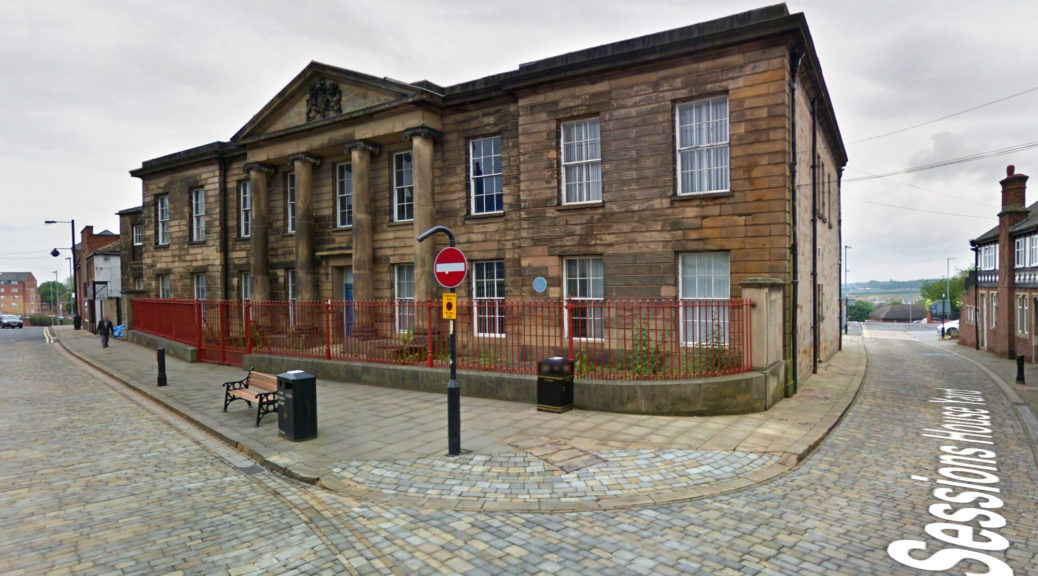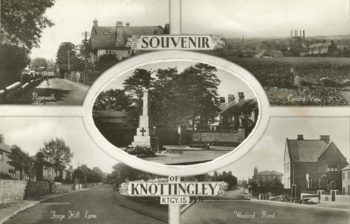
John Walden Poulson – the Wastrel – was growing up. At the very end of 1889 the 19-year-old became a married man, and in May 1890 a father. By the 1891 census he was Pottery Manager, versus just clerk on Emily Muriel’s birth certificate in 1890. In the Summer of 1891 his second daughter, Nellie Gwendoline was born and he was living next door to his father Edwin on Marsh End in Knottingley.
Over the next 5 years, business and political affairs appeared to be progressing for John Walden. In December 1892 he was elected to the Ferry Fryston (Ferrybridge) school board and was involved in Liberal politics in the Pontefract district – following his father Edwin Llewellyn Poulson.
In February 1893, Pontefract (the district in which Knottingley and Ferrybridge was situated) had a by-election for Member of Parliament – the current MP resigned when his father died, making him Lord St Oswald…
A by-election in a small Northern constituency wouldn’t normally attract much national attention, but retiring MP Rowland Winn was a Conservative and Prime Minister Gladstone’s Liberal minority government could use an extra vote. Contentious national issues – Irish Home Rule, one man one vote – and local ones – an eight hour workday – made for feisty politics.
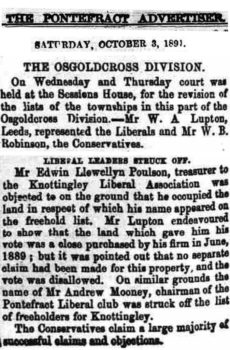
Political rivalries had been intense for some time, even in a small electoral district like Pontefract in the West Riding of Yorkshire. Each side would contest supporters of the other’s place on the voter rolls – you had to be a property owner or pay rent above a certain value to qualify. According to this 1891 article, the Conservatives were good at this challenge game. The year before, when Edwin’s older brother Thomas was treasurer of the local Liberal Association, a Leeds Mercury report of their voter outreach efforts said they’d added 500 Liberal voters over the prior year (in a constituency of about 2,500 total). Thomas was not well in 1893 (he died August 16th ) and Edwin was taking his place in political activities as well as at the pottery.
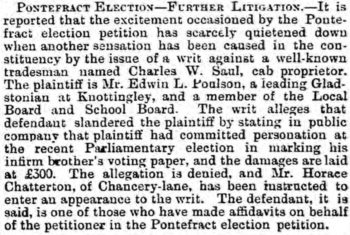
The Conservative candidate lost in the February 1893 by-election to Liberal Harold Reckitt, The loser, Mr. Shaw, filed an election petition to have the result nullified, alleging improper pre-election tactics. Supposedly the Poulsons were ferrying in out of town voters, buying unlimited beer on voting day and promising to give people seconds from the pottery in return for votes for Mr. Reckitt. One person, who turned out to be a Shaw partisan, claimed that Edwin had filled out his brother Thomas’ ballot paper – an offense called personation. Edwin sued him for slander claiming £300 in damages. That would be £37,000 today – I have been unable to find any newspaper reports on the outcome, sadly.
The efforts of John Walden Poulson and Edwin on behalf of the Liberal candidate had their names in papers all over the UK when the petition was heard over four days in early June 1893 in the West Riding Sessions House in Pontefract (shown in the Google Street View photo at the top of this post). In one part of the testimony, Reckitt’s campaign manager said of the two Poulsons: “I gave instructions to either Edwin Poulson or John Poulson to employ the same man in Ferrybridge as before. The Messrs. Poulson took no part in the election beyond being energetic and enthusiastic supporters of the Liberal cause, and did everything in their power help Mr. Reckitt.” All of which is perfectly legal.
The lawyer for Mr. Shaw, losing Conservative, had this to say about the roles of John Walden and Edwin: “There were men who … identified themselves in a prominent manner with the conduct of the election, and he referred particularly to gentlemen of the name of Poulson, who, he believed, were the proprietors of large pottery works at Ferrybridge…. They seemed to have determined to carry the election at any cost, to have made up their mind to provide drink in unlimited quantities in order to secure…voters. . . . two Ferrybridge inns which were … the head quarters of the Liberals… Drink appeared to have been supplied before, on, and after the day of election… Poulson himself ordered the drink, and told the landlord that he was to let any man who chose to ask have what he wanted…. [but] not to go too far.” If the judge had accepted the evidence about booze for votes, that would have been “treating”, which wasn’t permitted.
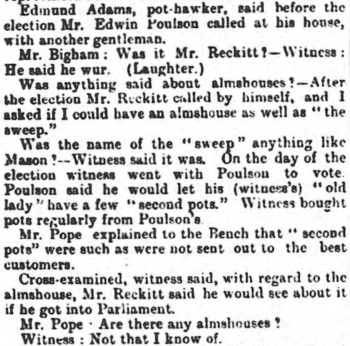
There was evidence given that implicated Edwin as well as John Walden, such as this testimony about offering seconds from the pottery. The judges didn’t accept the evidence that Reckitt was promising almshouses, so possibly they dismissed the whole story, but if true, offering free pots for votes seems like vote buying to me.
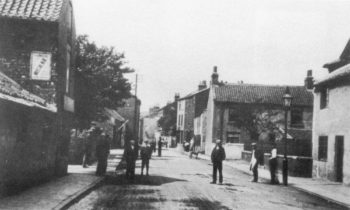
Various witnesses testified about going to the Bricklayers’ Arms pub on election day and not having to pay for beer; of seeing people talking to John Walden Poulson, seated by the door, when deciding whether to give more drinks when asked. One witness was asked “You did not know whose drink you drank?” and answered to laughter “I never want to know.” Another witness was asked how many pints he had and answered that he was in that happy state that he did not count. Another witness who testified he heard John Poulson say “All you men have voted. Will you have a drink?” was found on cross examination to be a Conservative. James Grice said he had a drink at the Greyhound with Mr. John Poulson, but it was not an unusual circumstance for that gentleman to treat him if they met!
The basis for Conservatives thinking there must have been inducements to vote was that the turnout was higher than in any prior election – 2,400 votes out of 2,518 possible. The Judges declared the seat vacant, but strongly criticized the Conservative candidate as reckless in bringing 109 charges with no evidence offered in 75 of them – only 3 were considered proven – charges described by the judges as amounting to personal vindictiveness. The loser didn’t have to pay costs (which he typically would have) except for the 3 successful charges (a judicial rap on the knuckles as I read it).Proven charges were that an agent the Poulsons hired had paid a train ticket for people to return to vote.
After the verdict, The Leeds Times reported people booed the Conservative candidate and cheered Mr. Reckitt as they walked from court house to lawyer’s offices. Sympathies varied around the country in the media coverage of the petition hearings. Some was pretty opinionated – such as this from The Scotsman: “The constituency is one of the smallest in the country. It has, besides, a somewhat evil reputation.” Nothing in the article explained what sort of evil that might be!
The Conservatives may have failed to make their legal case, but it certainly seems to me all the free drinks at two local pubs were persuasive to voters (who possibly didn’t much care what went on in Westminster anyway). To be guilty of treating, you had not only to give a voter something, but do so with the intention of securing their vote – something they didn’t prove.
A vacant seat meant another by-election, and there was one more small family drama in the nominations on June 23rd for new candidates in the do-over election . John Henry Shepherd and Edwin Llewellyn Poulson – family by marriage of their oldest daughter and oldest son – were on opposite sides! Shepherd for the Conservative and Poulson for the Liberal. You have to wonder what the conversation was like if there were ever any family gatherings!
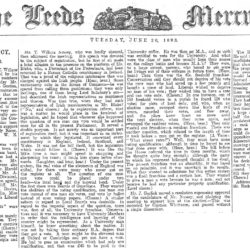
The new Liberal candidate, Nussey, won after a very intense campaign including appearances on his behalf by the still-popular Mr. Reckitt. I found the arguments in favor of dumping the property qualifications for voters persuasive. Vote for Nussey! A delightful article in the Guardian covers the June election mood in Pontefract. It notes that “Even in a borough which for generations has been distinguished for the keenness of its party feeling the bitterness imported into the present struggle is remarkable. The election dwarfs every other subject, whether of business or pleasure. . . . Every wall is adored with stinging phrases carefully selected from the speeches of Mr. Justice Hawkins and Mr. Justice Cave”
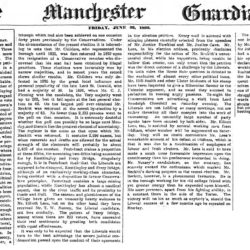
Some of the political issues from 1893 are still around today – the relationship between the UK and Ireland – now it’s the Northern Ireland border post-Brexit – and fair treatment of labor, although now it’s about how to regulate the gig economy versus getting an 8 hour work day. I find the Guardian’s coverage could almost have been written about contemporary political dust ups – “…as usual they succeed to perfection in rousing angry passions”. And politicians trying to have it both ways was there too – the losing Conservative was shouted down as he tried to tell miners he was in favor of the eight hour work day but not of legislation to enforce it.
The Yorkshire Evening Post must have been a Conservative-favoring paper as it sniped “The Pontefract people are rather hide-bound in their political convictions. … The similarity of the two last majorities is perhaps a tribute to their constancy if not to their intelligence.” Edwin wouldn’t have had time for fretting about that as the Midsummer Quarter Sessions were held the day of the election and he (as a magistrate) was in attendance in Bradford. Two men were fined £5 each (£600 today) for not attending the Grand Jury and there were 13 prisoners whose cases were to be heard. Life marches on.

